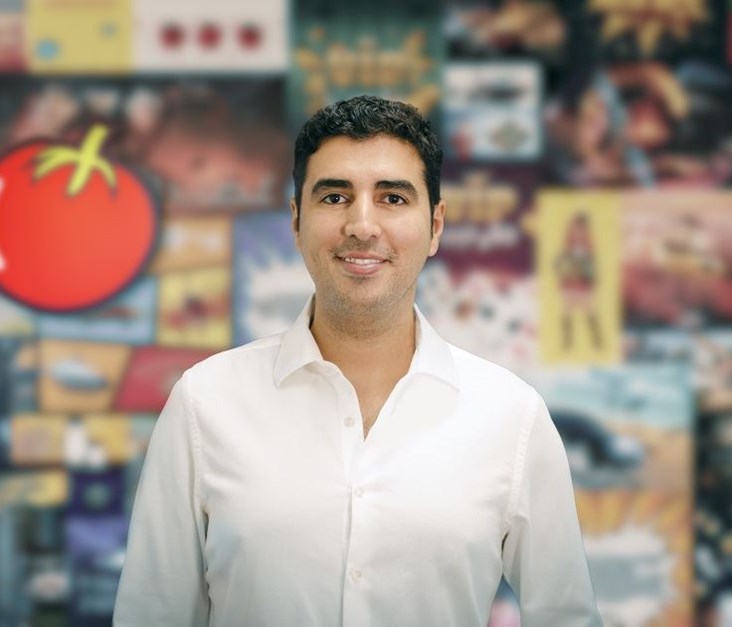
Sitting at a coffee shop on a Tuesday afternoon, he looks quite focused working on his laptop with his headphones on, disregarding the ambient noise around him of coffee brewing, music playing, and people chatting.
A founder of 6 startups, 3 of which he defines as projects, Abdallah Absi is a young serial entrepreneur determined to impact others through his innovative ideas. At the age of 26, Abdallah is an innovator who has been in the startup scene for almost a decade now and has gained a lot of hands-on experience working closely with VCs and entrepreneurs.
Passionate about impacting others, Abdallah never misses a chance to share his story with others to learn from his mistakes, take his success as an example, and acquire tips and skills for entrepreneurs.
I learnt a lot about Abdallah after having a chat with him at that same coffee shop.
You’ve founded and co-founded almost 6 startups up until now. Tell us more about your experience in doing so.
My first 3 startups were more of projects that lasted for about 6 months - my notable startups are 3. The first one was Rifflex (2010-2013), a browser plugin, which I decided to stop because making a business out of a browser plugin was not sustainable especially that browser plugins were dying at the time, and I was struggling with raising VC funding. However, this startup was a great first learning experience for me whereby I developed something of value from scratch, dealt with investors and business partners, built a network of connections, and matured a lot as an entrepreneur.
At that time, Walid Hanna saw me at one of the ArabNet conferences and asked me to join MEVP to help them find startups especially with my network of connections since I was very close to entrepreneurs. I saw joining MEVP as an opportunity to get an overview of how they look at startups, what criteria do they look for, and how do they deal with their pipeline.
While there, I saw an opportunity to start working on Zoomaal, a crowdfunding platform for the region, since I am very passionate about supporting young entrepreneurs in the region. MEVP loved my idea especially that crowdfunding was booming in the US and there was a huge need for it in the Middle East; for that reason, they decided to invest in my idea along with 2 other investors, Wamda Capital and Sawari Ventures.
My only problem, years later, was raising enough funding to keep it up and alive. Funding is a primary problem to getting things done instead of wasting the CEO’s time in fundraising. I left Zoomaal and moved to GivingLoop, a fundraising platform for nonprofits, which has a completely different market, and worked there for about 2 years in San Francisco.
I recently moved to Bokitta, a fashion retail company, which has been a challenge since it’s the first time that I’m not working on something from 0 to 1 but rather from 1 to 10. It feels like I’m putting my energy in a place that isn’t so risky where I might realize after 5 years that I haven’t done anything. In Bokitta, I’m spending time on something that is planning to grow and transform it to become more digital, tech enabled, and data driven.

What entrepreneurial tricks have you discovered to keep you focused and productive?
1. Setting meetings: The time you take meetings at is very important. I try to push all the meetings in my least productive hours whereas in the morning, one is still fresh and can put a lot of mental energy into things that need thinking and solving problems. Especially after lunch, one gets slower, so focusing on things becomes harder. I also tried, for a short period, having all my meetings done in one day so that I have the rest of the week to focus on other things.
2. Having a to-do-list: Setting a to-do-list from the beginning of the day helps you stay on track of what needs to be done and what the objectives of the day are. With all the different social media networks and the distraction that comes with them, it is important to have a list to go back to when you get distracted to guide you through the tasks of the day. I usually have a weekly one as well to coordinate work across the team.
What would you say are the top skills needed to be a successful entrepreneur?
“Entrepreneurs need to have comprehensive skills that are not taught in any university about running a business, dealing with people, dealing with businesses, being a great salesperson, closing deals, pitching to investors and VCs…”
1. Continuous learning: You have to keep learning to know how to be a good HR to hire the right people and to know how to be good in technology to know how to plan your products. Entrepreneurs need to have comprehensive skills that are not taught in any university about running a business, dealing with people, dealing with businesses, being a great salesperson, closing deals, pitching to investors and VCs… You can only gain these if you keep on learning through reading books and online articles.
2. Choosing the right people: Choose people who can give their all, are very passionate, can increase the general knowledge of the whole team, and help the company grow. Most entrepreneurs think they know everything because they’ve been in the industry for awhile, but there might be members in your team who are smarter in other fields such as marketing or technology. That is why it is important to choose the right people and put them in positions where they can take their own decisions to drive your company forward.
Have you ever reached a point where you thought of leaving everything and giving up?
No. I would quit a startup if I saw that there wasn’t potential in it. I would move into something that is equally or more challenging than the one before. Giving up is overrated; you need to give up at one point, but that doesn’t mean that you lost.
“Giving up is overrated; you need to give up at one point, but that doesn’t mean that you lost.”
You have to give up because that is your time. If you keep on wasting your time in the wrong market or product, it’s your loss. That is when you have to actually give up and work on something else. Giving up and sticking to a stable job isn’t wrong, but if you aren’t productive, than that is wrong. Always look at things that keep you excited and make you feel productive by adding value to what you do.
With Bokitta now, it’s an opportunity to be in something that is challenging, brings a lot of value, and makes me feel productive at the same time in the region. I am doing something that is completely different, but what is important is bringing value.
If you had the chance to start your career over again, what would you do differently?
Any startup needs to have an unfair advantage in a particular market/industry that comes from the connections you have in that space or experience - you know the challenges and gaps of that industry based on your previous experience in it. The place you are in is very important to build a network of connections that build up to this unfair advantage.
Starting from Lebanon was very challenging because of its small customer and entrepreneurial market. Let’s say there are 5 investors and you get to know them all, but if none wants to invest in it because they do not believe in your idea or do not focus on it, raising funds becomes harder. I always thought that if I had begun 9 years ago in Silicon Valley, where I was based and built my first couple startups, I think things would’ve been different.
I don’t regret it though; one thing I was very passionate about was that we need to grow something from the region and that is why I came back - to raise new generations of entrepreneurs in the Arab world and emerging markets. You have to find a balance between being very productive and your personal mission in life which, to me, is to impact others.
What advice would you give rising startups?
“Founding a startup is like taking a lottery ticket, you never know if you will win or not.”
I would tell rising startups that either they are running a successful business or not. If entrepreneurs don’t aim at impacting others and are just after the money, entrepreneurship is the worst way to make money whereby one can simply go up the ladder in a stable career and make money. In entrepreneurship, you have to take risks and risk your money, and at the end of they day, your idea might not work.
Many entrepreneurs fall in the entrepreneurship cycle. It begins with the uninformed optimism phase whereby entrepreneurs are overly ambitious and venture into their startup thinking that it will succeed. Then entrepreneurs pass through the phase of informed pessimism where entrepreneurs are hit by the reality of life in which they witness several problems such as lack of money and struggling to pay employees’ payrolls… Finally, entrepreneurs pass through the informed optimism phase whereby they now know how to play the game and have learned from their mistakes to make better choices in the future.
Entrepreneurs should find a balance between being realistic and being optimistic. Founding a startup is like taking a lottery ticket, you never know if you will win or not.
Latest Business
Intelligence Report














